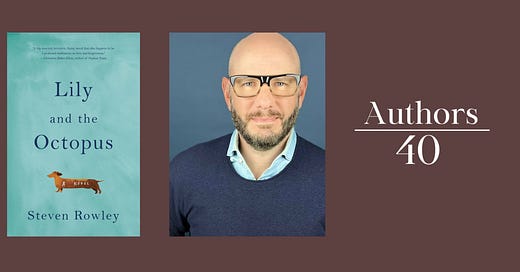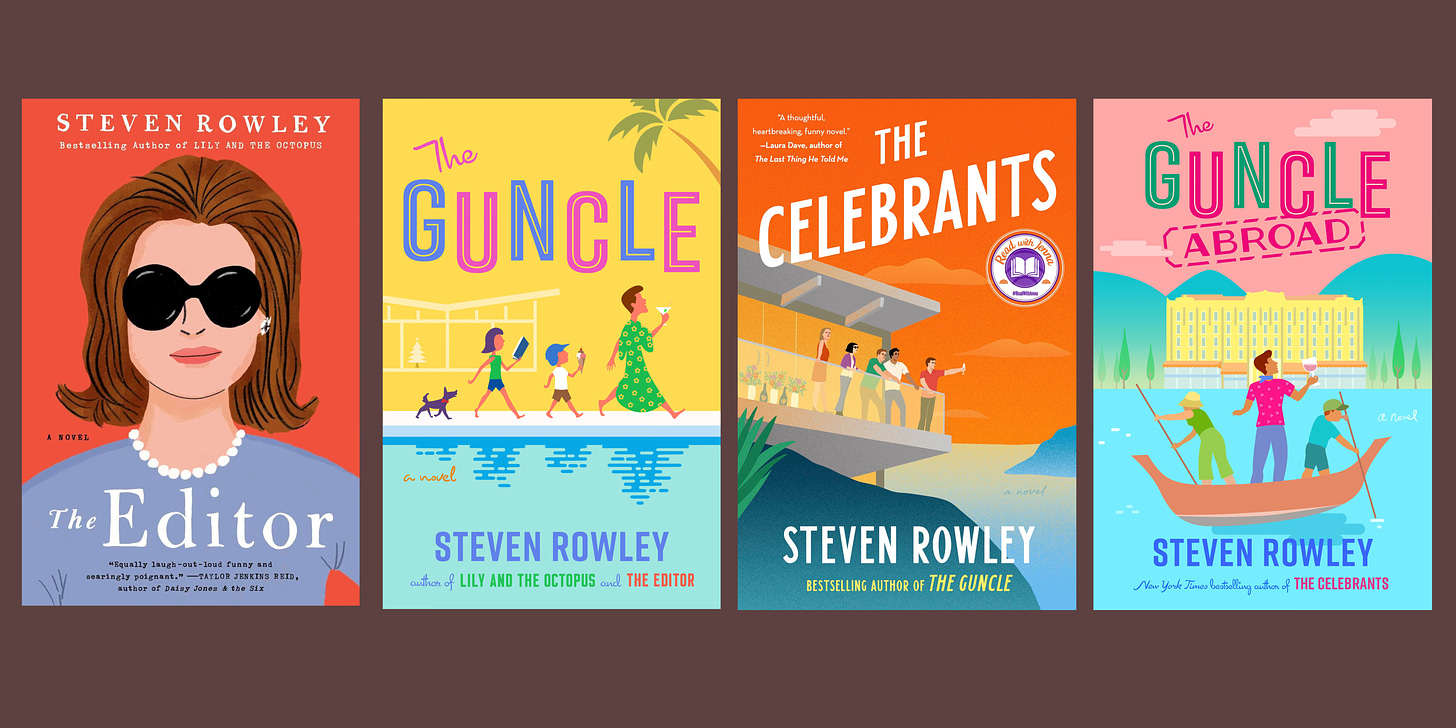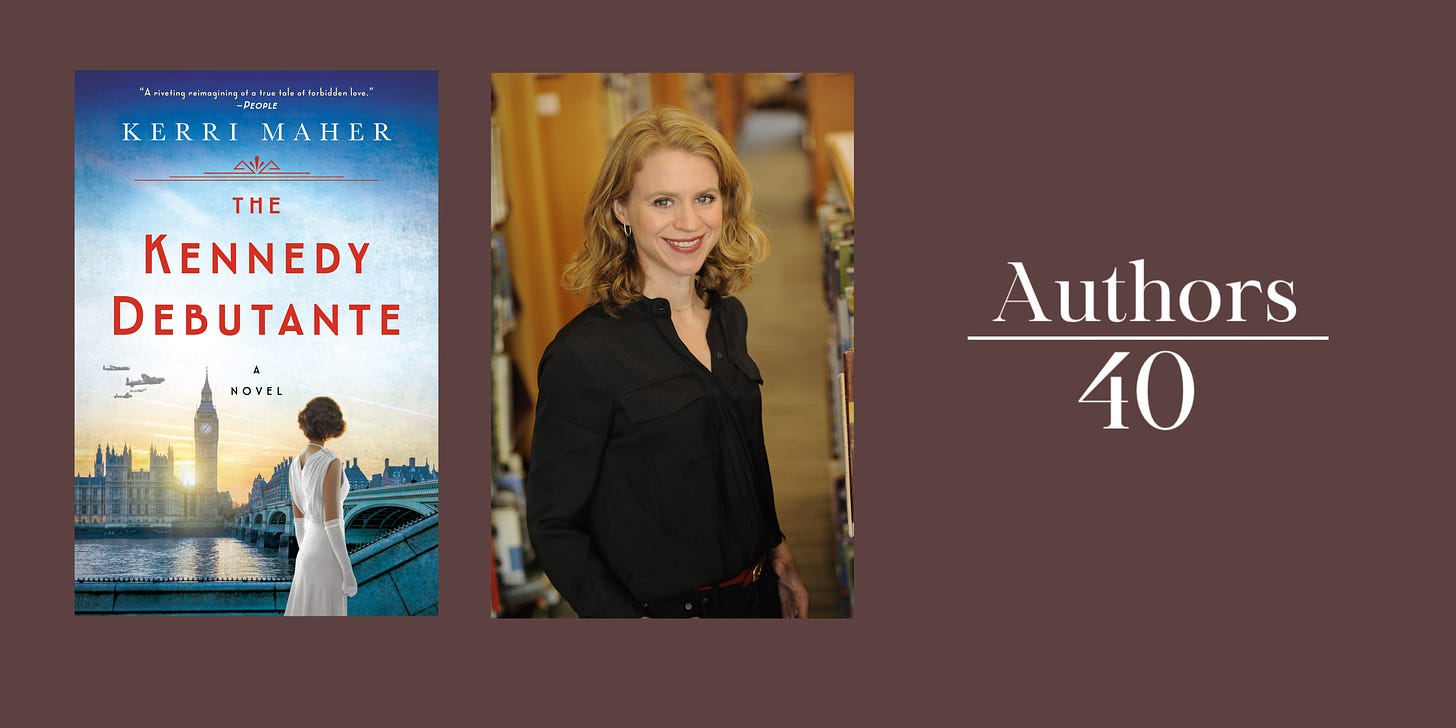"I am a writer because I write."
On not going to law school, getting your butt in the chair, and other secrets to braving rejection on the way to success.
I am lucky to call Steven a friend and colleague. We did two memorable events together in 2023, one at An Unlikely Story, Jeff Kinney’s stunning bookstore in Plainville, MA, and another at the incomparable Warwick’s in La Jolla, CA - plus dinner before and plenty of chatting in between. We were originally brought together by a panel we were on because we both wrote novels about Kennedys (I wrote about Kick Kennedy for my debut, and he wrote about Jackie Kennedy Onasis in The Editor).
I’ll never forget when I read his Instagram post announcing that his most recent novel The Celebrants would be a Read with Jenna book club pick - he wrote so eloquently about not finding success as a writer until mid-life, and his immense gratitude for the recognition his work had recently received. And not just from Jenna—The Celebrants was also a New York Times bestseller, and The Guncle won the Thurber Prize for American Humor.
His post got me thinking more about an idea I’d been carrying around to celebrate writers whose first novels published after their 40th birthdays. I mean, we older writers have a lot of wisdom to offer writers at every stage of their journey.
And I knew Steven had to be my first interview.
VITAL STATS:
Your age when your first novel published, and the title of that novel: Lily and the Octopus was published when I was 45
Your age now: 52
How many novels you’ve published to date: Four - Lily and the Octopus, The Editor, The Guncle, The Celebrants
What’s your next novel: The Guncle Abroad arrives May 21st
INTERVIEW:
(Since this is the first AO40, I’ll just mention that I’ll be asking the same 6 questions to every author, which will enable us to compare and really meditate on the answers across authors.)
1. How many novels did you complete before the one that became your first published novel?
I have two complete novels (and several false starts) in a drawer that I wrote all before Lily and the Octopus was sold. Despite extensive querying, both failed to land me an agent. In fact, Lily also failed to secure representation and after a year of querying, I decided traditional publishing was not going to be my path and committed to self-publishing. Self-publishing can be a fantastic option for writers, but offerings run the gamut. I knew I wanted my novel to be as polished and professional as possible, so I hired a freelance editor to give me both a developmental and copy edit. She instantly saw the commercial potential in my book and used her contacts to get it to an editor at Simon & Schuster. I had an offer within the week and had to get an agent quick. I went back to one of my top choices. When I first queried him he was in the process of moving his business from New York to LA and the timing wasn’t quite right. As it turns out, it’s much easier to get an agent’s attention when you have an interested publisher!
I have a third manuscript in the drawer that I wrote after my first two novels were published. I very much like that book, but it’s different than my other fiction and I didn’t think it was the right book to publish next while I was still establishing a readership. Since it took me so long to get where I was, I was interested in building a career and not just hopping from project to project. So even after you’re published, it doesn’t mean everything you write will (or should) find a home.
2. What kinds of jobs did you have to support yourself while you wrote? Are you still doing one of them?
For years I worked as a paralegal in an entertainment law firm. I took the job originally knowing that it would keep me focused on my writing. Since I hadn’t gone to law school, I couldn’t be chasing a promotion and I thought taking a job with a ceiling would keep me creatively hungry. But a large part of my job consisted of drafting contracts for other artists whose dreams were coming true, and after a several years that took an emotional toll. I’ve been lucky to support myself as a writer for eight years now. I never take that for granted. The vast majority of writers hold down other jobs and I’m always prepared to do that again when this ride starts to deaccelerate.
But one thing that’s changed: I will always first and foremost call myself a writer. I used to say it with some shame when it wasn’t how I supported myself financially. People would ask me what I do and I would sheepishly say I was a paralegal who also writes in my spare time. Almost apologetically. No more. I am a writer because I write. How I make my income is secondary.
3. What was the writing routine in which you wrote the novel that became your first published? How long did it take to write that book?
I wrote the first draft of Lily and the Octopus rather quickly, in only three or four months. I’m kind of astonished by that today, as a first draft usually takes me the better part of a year. And I did it while holding down a full-time job. The difference for me was prioritizing my writing. I used to write at night – after work – when I was tired and more often than not couldn’t be bothered. So when Lily started to flow, I made myself a morning person and got in a few hours of writing before work. That way, whatever the day threw at me, I knew I had already done something for my creative soul.
4. What was your darkest moment before selling your first novel?
I enrolled in law school classes at UCLA. My brother and sister had both gone to law school and so I figured I had just been delaying the inevitable. After one semester I was miserable. That’s when I wrote Lily and the Octopus. It was a last ditch effort to save me.
5. What advice about writing helps you stick with it?
There are as many different answers to process questions as there are writers. For me, it’s not outlining. I know that seems horrifying to some. I usually have a good sense of the beginning and also where I want to go. But when the middle of a book is outlined to within an inch of its life, then writing feels like factory work. Assembling. The hardest part about the job is getting your butt in the chair. When I don’t know what’s going to happen with my characters that day, I’m much more inspired to show up and find out.
6. What is your favorite part about the writing life?
It’s the little quiet moments of discovery. A perfect joke. A beautifully crafted sentence. The time alone with your thoughts that lead to the right breakthrough. There have been quite a few big moments that have also been exciting. Book events with shockingly large crowds (I’ll always remember our incredible event together at An Unlikely Story!). Appearing on the TODAY Show. Speaking at the National Celebration of Reading alongside the First Lady. But it’s truly the quiet moments that make the endeavor of writing so rewarding.
Thank you so much, Steven! I learned so much from your answers, and I know other writers will benefit from your story.
Paid subscribers make my work possible. Become an annual paid subscriber for $30 for a year—the equivalent of buying a hardcover book.







I published my first book in 2022 at age 61. My mother published her first book in the same year--she was 89. Now 90, she’s working on book #2.
When I first read about this series, I was excited. I've just hit the big 40 and I felt like so many accolades are placed on younger writers.
This first post was a cracker. I loved Steven's comment about being a writer because he writes. 🙌 His journey to publication was a fabulous insight into how the industry can work.
Thanks for shining a spotlight on those of us with more life experience under our belts. I can't wait to read the next instalment.